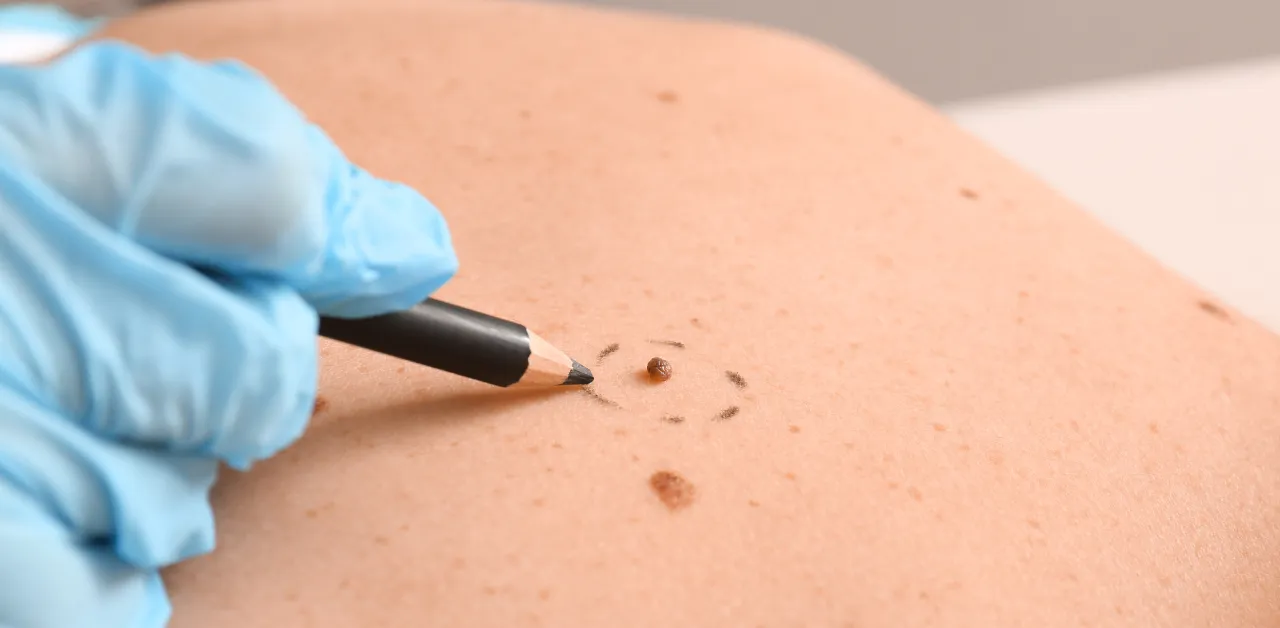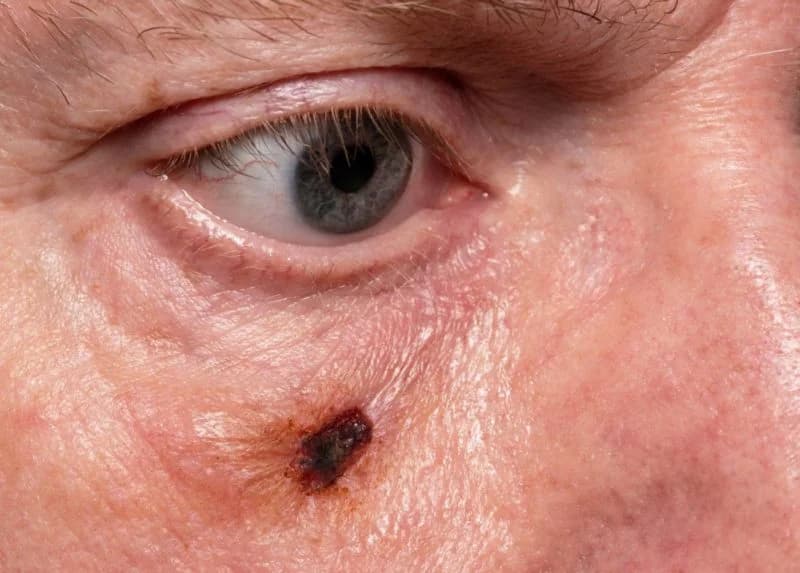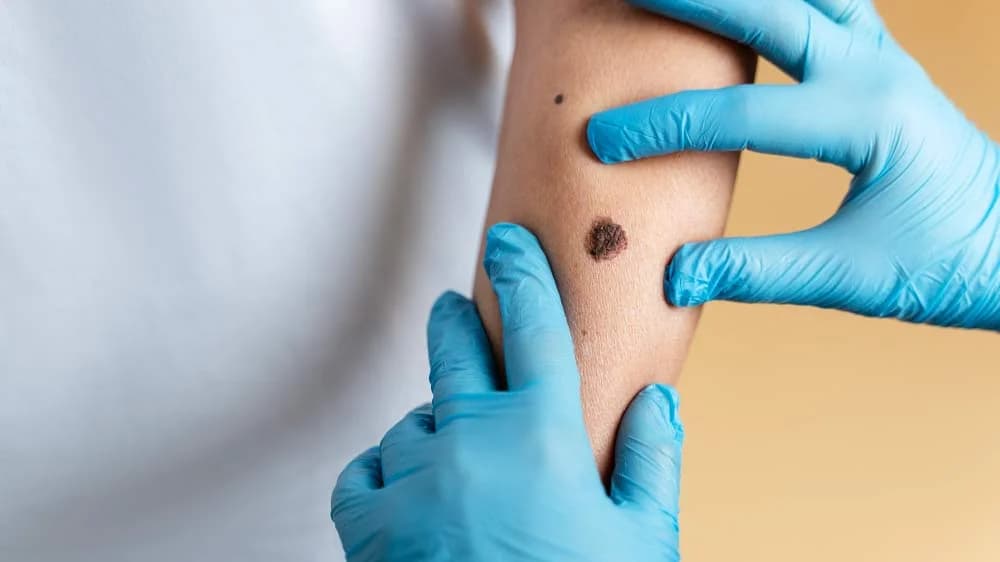Skin cancer occurs when there’s a change in how your skin cells grow, usually exposure to ultraviolet light. You may notice new bumps or patches on your skin, or changes in the size, shape, or color of skin growths. If caught early, most skin cancer is treatable. Treatments include Mohs surgery, cryotherapy, chemotherapy, and radiation.
What is melanoma?
Melanomaskin cancer develops in melanocytes and usually, the parts of the body that have been overexposed to the sun. This type of skin cancer can also occur inside the eye or parts of the skin that have never been exposed to the sun.

What are the signs and symptoms of skin cancer?
The most common warning sign of skin cancer is a change on your skin — typically a new growth or a change in an existing growth or mole. Skin cancer symptoms include:
A new mole. Or a mole that changes in size, shape, or color, or that bleeds.
A pearly or waxy bump on your face, ears, or neck.
A flat, pink/red- or brown-colored patch or bump.
Areas on your skin that look like scars.
Sores that look crusty, have a depression in the middle or bleed often.
A wound or sore that won’t heal, or that heals but comes back again.
A rough, scaly lesion that might itch, bleed, and become crusty.
How is skin cancer staging?
To determine if you have skin cancer or if it has spread to other parts of the body you will be tested. The staging of melanoma & non-melanoma skin cancer includes:
Melanoma staging
Stage 0 (melanoma in situ): The melanoma is only in the top layer of your skin.
Stage I: The melanoma is low risk and there’s no evidence that it has spread. It’s generally curable with surgery.
Stage II: It has some features that indicate that it’s likely to come back (recur), but there’s no evidence of spread.
Stage III: The melanoma has spread to nearby lymph nodes or nearby skin.
Stage IV: The melanoma has spread to more distant lymph nodes or skin, or has spread to internal organs.
Non-melanoma staging
Stage 0: Cancer is only in the top layer of your skin.
Stage I: Cancer is in the top and middle layers of your skin.
Stage II: Cancer is in the top and middle layers of your skin and moves to target your nerves or deeper layers of skin.
Stage III: Cancer has spread beyond your skin to your lymph nodes.
Stage IV: Cancer has spread to other parts of your body and your organs like your liver, lungs, or brain.

How does staging affect treatment?
Skin cancer statin will determine the specific type of treatment recommended to a patient. For example, topical chemotherapy might be an option for small, low-risk lesions, while more extensive surgery might be necessary for later-stage cancers. By choosing the least aggressive treatment that is effective for a specific stage of cancer, an oncologist can individualize a patient’s treatment plan while ensuring the best possible quality of life.
Skin cancer treatment options
If the cancer tissue is small and limited to the surface, a biopsy alone can remove all the cancer. Other common skin cancer treatments, used alone or in combination, include:
Cryotherapy: Liquid nitrogen is used to freeze skin cancer. The dead cells slough off after treatment.
Excisional surgery: The tumor and some surrounding healthy skin are removed to be sure all the cancer is gone.
Mohs surgery: Only the diseased tissue is removed, saving as much surrounding normal tissue as possible. Used for areas like your eyelids, ears, lips, forehead, scalp, fingers, or genital area.
Curettage and electrodessication: Using an instrument with a sharp, looped edge the cancer cells are removed as it scrapes across the tumor. Then, they use an electric needle to destroy any remaining cancer cells.
Chemotherapy: Your dermatologistoroncologist uses medications to kill cancer cells. Anticancer medications can be applied directly on the skin (topical chemotherapy) if limited to your skin’s top layer or provided through pills or an IV if the cancer has spread to other parts of your body.
Immunotherapy: You will be given medications to train your immune system to kill cancer cells.
Radiation therapy: Radiation (strong beams of energy) is used to kill cancer cells or keep them from growing and dividing.
Photodynamic therapy: Your dermatologist coats your skin with medication, which they activate with a blue or red fluorescent light. This therapy destroys precancerous cells while leaving normal cells alone.

Complications/side effects of the treatment
The side effects of skin cancer treatment depend on what treatments your healthcare provider thinks will work best for you. Chemotherapy for skin cancer can lead to nausea, vomiting, diarrhea, and hair loss. Other side effects or complications of skin cancer treatment include:
- Bleeding
- Pain and swelling
- Scars
- Nerve damage that results in loss of feeling
- Skin infection
- Regrowth of the tumor after it’s been removed
Conclusion
In conclusion, skin cancer stages and treatments are crucial aspects of managing this prevalent disease. The stage of skin cancer is determined by the size, location, and spread of the tumor, and it plays a significant role in devising the treatment plan. Early-stage skin cancers are typically treated with surgical procedures, such as excision or Mohs surgery, and have a high success rate. Advanced stages may require a combination of treatments, including radiation therapy, chemotherapy, or targeted therapy. It’s important to note that the effectiveness of treatments varies among individuals and depends on the type of skin cancer and its stage. Regular skin checks, early detection, and prompt treatment are key to improving outcomes.
Read more: